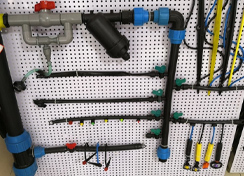Dec . 14, 2024 08:52 Back to list
High-Density Polyethylene Water Supply Pipe Solutions for Reliable Water Distribution Systems
HDPE Water Supply Pipe Products A Comprehensive Overview
High-Density Polyethylene (HDPE) pipes have revolutionized the way water is supplied in both urban and rural settings. Known for their durability, flexibility, and resistance to corrosion, HDPE pipes have become a staple choice for water supply systems worldwide. This article explores the characteristics, advantages, applications, and environmental considerations of HDPE water supply pipe products.
Characteristics of HDPE Pipes
HDPE pipes are made from high-density polyethylene, a thermoplastic that provides exceptional strength-to-weight ratio. These pipes come in various diameters, lengths, and pressure ratings suitable for different applications. One of the notable features of HDPE is its smooth interior, which minimizes friction losses and ensures efficient water flow. Additionally, HDPE pipes are available in various forms, including solid-wall, profile-wall, and dual-wall designs, catering to different pressure requirements and installation methods.
Advantages of HDPE Water Supply Pipes
The popularity of HDPE water supply pipes can be attributed to several key advantages
1. Durability HDPE pipes are resistant to rust, corrosion, and chemical degradation. They can last for decades with minimal maintenance, making them a cost-effective solution in the long run.
2. Flexibility HDPE pipes have a remarkable degree of flexibility, allowing them to bend and curve around obstacles without the need for joints. This characteristic is particularly beneficial in areas with rocky or uneven terrain.
3. Lightweight Compared to traditional materials like ductile iron or concrete, HDPE pipes are significantly lighter, simplifying transportation and installation. This also leads to reduced labor costs and time during the installation process.
4. Resistance to Leaks HDPE pipes can be joined using various methods, including butt fusion, electrofusion, and mechanical jointing. These techniques create strong, leak-free joints that enhance the overall integrity of the water supply system.
5. Environmentally Friendly HDPE is 100% recyclable, and its production process has a lower carbon footprint compared to other piping materials. Additionally, the longevity of HDPE pipes means less waste generated over time.
hdpe water supply pipe products

Applications of HDPE Pipes
HDPE water supply pipes are utilized in a variety of applications, making them a versatile choice for many projects
1. Municipal Water Systems Many cities and towns have switched to HDPE for their water distribution networks, as it can handle high pressures and is resistant to adverse environmental conditions.
2. Irrigation Agriculture relies heavily on efficient water delivery systems. HDPE pipes are ideal for irrigation due to their flexibility and resistance to chemical fertilizers.
3. Industrial Use Various industries utilize HDPE pipes for transporting water and other fluids, given their resistance to corrosive substances and ability to withstand harsh operating conditions.
4. Rehabilitation HDPE pipes can be used for trenchless installations, allowing for the rehabilitation of existing pipelines without extensive excavation.
Environmental Considerations
The environmental impact of HDPE pipes is often a point of discussion. While their production does involve energy consumption, the durability and lifecycle of HDPE pipes contribute positively to sustainability. The longevity of these pipes reduces the frequency of replacements, resulting in less waste. Furthermore, as mentioned earlier, HDPE is fully recyclable, allowing it to be repurposed at the end of its lifecycle.
Moreover, the use of HDPE pipes can lead to reduced water loss due to leaks, significantly benefiting water conservation efforts. In a world where freshwater resources are increasingly under pressure, adopting efficient systems helps ensure a sustainable future.
Conclusion
HDPE water supply pipe products are synonymous with modern plumbing solutions. Their unique combination of durability, flexibility, and cost-effectiveness makes them a preferred choice for a range of applications. As municipalities, industries, and commercial enterprises look to improve their water delivery systems, HDPE pipes are set to play a crucial role in the future of water supply infrastructure. As we continue to advance, the integration of sustainable materials like HDPE into our water systems will help meet the demands of growing populations while preserving valuable natural resources.
-
High-Quality PVC Borehole Pipes Durable & Versatile Pipe Solutions
NewsJul.08,2025
-
High-Quality PVC Perforated Pipes for Efficient Drainage Leading Manufacturers & Factories
NewsJul.08,2025
-
High-Quality PVC Borehole Pipes Durable Pipe Solutions by Leading Manufacturer
NewsJul.08,2025
-
High-Quality PVC Borehole Pipes Reliable PVC Pipe Manufacturer Solutions
NewsJul.07,2025
-
High-Quality UPVC Drain Pipes Durable HDPE & Drain Pipe Solutions
NewsJul.07,2025
-
High-Quality Conduit Pipes & HDPE Conduit Fittings Manufacturer Reliable Factory Supply
NewsJul.06,2025

